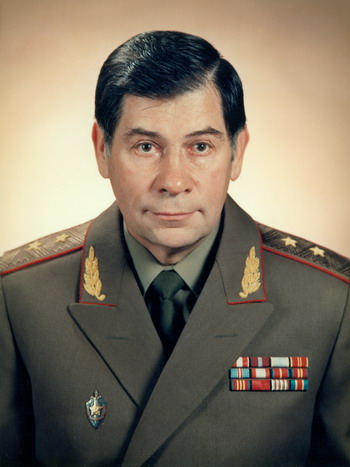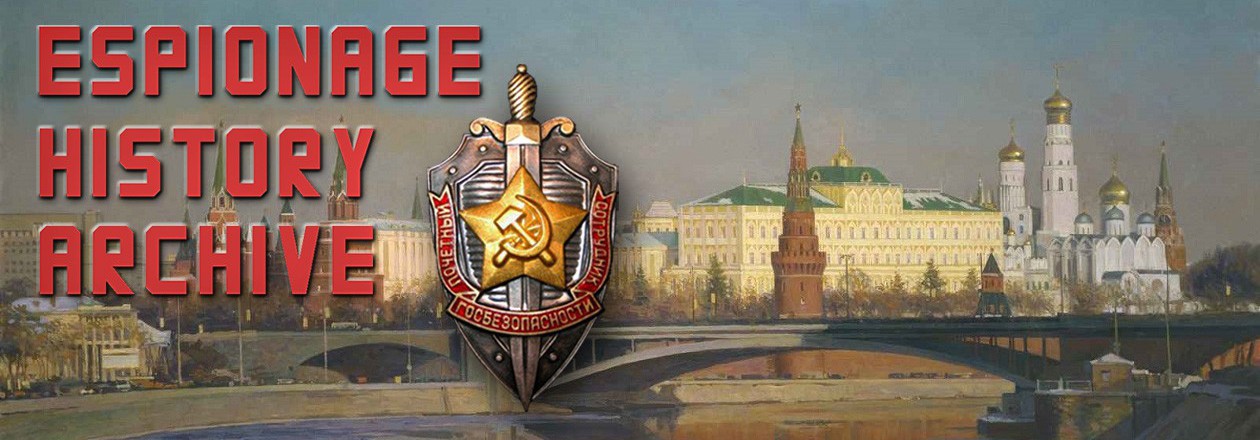KGB Lt. Gen. Leonid Vladimirovich Shebarshin (1935-2012) was an experienced specialist on South Asia and Iran and would become the last chief of the Soviet KGB’s First Chief Directorate (Foreign Intelligence) in 1989. In his memoirs, Shebarshin recalls his time training at the KGB’s 101st Intelligence School in 1962.
101 – That was the name of the intelligence school subsequently transformed into the KGB’s Yuri Andropov Red Banner Institute.
For the first time in my life I was quartered in a dormitory. In the two-story wooden house of pre-war construction, the walls were starting to become dilapidated, in places the floors would bend, but it was warm and cozy in the winter, and in the spring lilac branches would brush against the windows.
In the room there were five continual residents, all with some life experience, and among us even a doctoral candidate. We all had switched professions. We were allowed home only on Saturdays, to return by Monday morning.
Academics didn’t seem complicated. The most difficult subject for those who hadn’t worked with them earlier was foreign languages. We had no such problem – between the five of us we had mastered nine languages from professional civilian training. In the spirit of good tradition, we helped our comrades who hadn’t worked with languages earlier as much as we could.
Eternal Marxism-Leninism. Much academic time was relegated to it, and exercises in this subject resembled the eastern method of threshing – an animal tied to a shaft walks in a circle along the sheaves lied out on the threshing floor, and its hooves dislodge the grain from the ears. Every one of us had already made several rounds over the trampled hay, it wasn’t clear whether any grains were left there, but the senseless stamping continued. Neither quick-wittedness nor erudition were needed here; just memorize a few current clumsy expressions, follow the front-page articles in Pravda (the most thankless and mind-numbing reading for any intellect), and don’t get upset.
Marxism-Leninism in its interpretation then was extremely remote from science. Its clichéd formulas and concepts had the character of ritual incantations, something akin to a daily and hourly affirmation of loyalty. Every academic text, even in our rather special academic institution, began with a pious thesis on the class character of intelligence. (The time when class character was ascribed to physics, biology, and mathematics was departing slowly. Things happen slower in Russia than elsewhere.)
Lectures on Marxism and time spent on preparation for seminars gave us, however, a splendid opportunity to read anything we liked to our satisfaction. The people selected for our room were not drinkers, but interested in life and readers, and we enjoyed books not so much from the library as those we exchanged amongst each other.
The special disciplines seemed incredibly interesting, i.e. training in the basics and techniques of spycraft. In the following years in our medium, the term “art of intelligence” was officially disseminated, but I object to it. I suspect that initially it came about as a result of the not completely accurate translation of the name of the book by former CIA chief Allen Dulles The Craft of Intelligence (It would seem that Dulles could have used the word art if he considered intelligence an art). Doubtless, the vanity of professionals played its role. Belonging to the sphere of the arts rather than a craft elevated many in their own eyes.
I consider intelligence a complex and unique craft, where, as in every craft, there is an element of art where corresponding skills are necessary, yet mastery of the basic techniques of the job, painstaking labor, thorough professional training, and conscientiousness are more important than the fits of inspiration by which art lives. I defended this view in further official discussions, far from always meeting the approval of veterans. Great is the charm of words; it’s difficult to rid oneself of it.
Photography in all its special variations; the preparation of microdots; secret writing; methods of communication; ways to covertly remove information; the fundamentals of acquiring sources and work with them; methods of conducting surveillance and techniques for detecting it – all of that was new and extremely fascinating.
The crowning moment of all this came as practical exercises in the city that lasted several days. We had to carry out a number of operations for communicating with an agent, including a personal meeting. The most complex assignment was ensuring there was no surveillance on you in order to keep the counterintelligence service from identifying an operation underway, and, God forbid, from finding our source.

To detect surveillance and determine the makeup of the team working against you is not a simple assignment. Professionals from the KGB’s Seventh Directorate undergoing more training worked with us. Upon the completion of exercises, reports from the intelligence trainee – the object of surveillance – and the reports of the surveillance team were compared.
This was a rare situation that arose in real conditions only when we were able to acquire a source in the Soviet department of a foreign counterintelligence service. There, however, the joint analysis of an operation and exposing inaccuracies in reports would be excluded. Human weaknesses are inherent to surveillance operatives of foreign services, and blatant distortions of the real situation in their summaries are a rather common matter. In any case, mention of their own mistakes is not encountered, and the target is sometimes endowed with superhuman versatility and craftiness. This tends to be when the surveillance team lose the target due to their own sluggishness or lack of coordination in their actions.
We weren’t allowed to depend on surveillance revealing itself. One must not, with the exception of extreme situations, check for them in an obvious fashion. During exercises and in life, we proceeded from the fact that the intelligence officer’s behavior shouldn’t cause suspicion either from professionals or random observers. If a surveillance service notices that a foreigner is blatantly checking for a tail, it will be stimulated to work more secretly, more tenaciously, and with more ingenuity. The foreigner makes it into a list of suspected or established intelligence officers, which can complicate his life.
In such a way, for a successful surveillance check, a previously selected natural route is necessary, one that allows for observing the situation around you multiple times unnoticed. Sometimes in both training and active operational conditions, counter-surveillance is used – at various points on the intelligence officer’s route other operatives are standing post. It’s easier for them to notice a possible tail and by pre-arranged signal (by radio, a car parked at a specific spot, etc.) warn their colleague of danger. An effective method, though not without its drawbacks. The people who have been moved out to counter-surveillance points might also bring a tail. There have been such cases. It’s undesirable that anyone but the resident or his deputy knew about the planned operation and the area of its execution. This rule, unfortunately, is violated everywhere. There’s still another negative moment: knowing that his comrades are covering him, the operative conducting the operation can over-relax and lose vigilance.
An intelligence officer in the field is alone, and in all situations he should depend only upon himself.
We painstakingly prepared routes, foreseeing changes in transport, dropping into buildings, the logical connection of our actions. In the school descriptions of places convenient for surveillance checks are passed on from generation to generation. (To get lost in the crowd, by the way, is practically impossible, since it’s impossible to detect surveillance in a crowd.) The tragedy is that such descriptions are passed from generation to generation amongst our opponents – the surveillance operatives. One must search out one’s own original maneuvers.
The exercises were completed successfully. We were able to detect surveillance and safely carry out all planned operations for communicating with the source. The game was captivating.
This was a game, but it was played by the genuine rules and demanded real nervous tension, imagination, and simply physical endurance. The game introduced the trainees to the profession, initiated them into professional secrets, and united us into a corporate body.
A few words on corporative spirit. In the Committee for State Security there had long ago formed a special and respectful, but with a shade of coldness and envy, attitude toward the First Chief Directorate (FCD). Officers of the service were in many ways better trained that the remaining personnel of the KGB overall, they worked overseas, and were thereby more secure materially. They didn’t have to engage in “dirty work,” i.e. fight against internal subversive elements, the circle of which never radically narrowed.
To make it into service in the FCD was the object of concealed and open dreams of the majority of young officers of state security, but only a few were made worthy of this honor. Intelligence was an organization closed off not only from society, but in a significant degree from the KGB. The very specifics of the work united intelligence officers into a unique camaraderie with its own traditions, discipline, conventions, and special professional language. It always seemed to me that camaraderie and corporative spirit were necessary for men engaged in a common cause. Precisely in the framework of such a body one can share one’s experience, resolve doubts, and get to know each other better. Our work was predominantly tenacious and unnoticeable labor, slow progress forward toward some hidden goal, but there could be moments when success and even the fate of an officer depended on the assistance of his colleagues.
I want to repeat – the men of our profession should present themselves as a corporation, a brotherhood. This is the basis of our moral well-being, and consequently, our success.
Training was interesting. During spring exercises I was able to come up with a scheme for carrying out a dead-drop operation using a container that was very simple in manufacture and use. The operation was awarded with a prize. I felt like a professional. I managed to apply my successful idea in future practice, and it was vindicated.
It’s necessary to train intelligence officers individually. A different state of society is needed for this, a different attitude toward expenditures, contemporary psychology, and toward the future intelligence officer. The extensive method of training, when a trainee and young officer are given just a little and least of all the ability to independently think and orient themselves in acute situations and make decisions in the moment, has outlived itself. But for all its shortcomings, the school cultivated a feeling of camaraderie that was one of a kind.
I remember our room on a winter evening. On the table were tea and black biscuits, left to the side was a chessboard. We were still green, but we were serious and single-minded. We spoke not about women, sports, or drinking – traditional subjects of conversation for young men. The topic that randomly arose today was ethno-psychology. A scholarly colleague, one of the trainees from our room, was edifying the rest. We debated, smoked, drank tea, and learned something important – we were learning to think.
Work Translated: Рука Москвы – записки начальника советской разведки. М.: Центр-100, 1992.
Translated by Mark Hackard.


Reblogged this on Jay's Analysis.
LikeLike
Reblogged this on TheFlippinTruth.
LikeLike